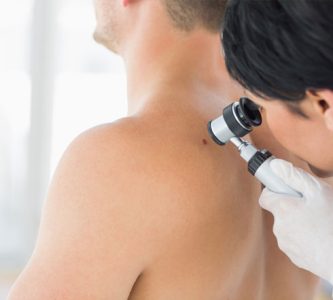Mole check and skin cancer screening

- The incidence of skin cancer and melanoma is on the rise despite warnings of the dangerous effects of sun exposure.
- It is important for regular mole checks and skin check to detect skin cancer early.
- If left undiagnosed and untreated, melanoma can evolve and spread to other parts of the body which can be fatal.
How do we check the moles for skin cancer?
It is advisable to do regular check of your own moles at home once a month, especially if you have a lot of moles or freckles, fair skin which burns easily, or with a strong family history of skin cancer. Self examination of moles can be performed using a full length and hand held mirror to view the entire body, or recruit help of family members to identify any new moles or existing moles which are recently changing in size, shape or colour.
Any suspicious looking mole or skin lesion should prompt a visit to see the dermatologist for a thorough examination with a dermatoscope. A skin biopsy can be performed for any suspicious mole or skin lesion to confirm the diagnosis.
A regular full body dermatoscopy skin check and mole examination should be performed by the dermatologist at least 6-12 monthly, so that suspicious moles can be identified and any skin cancer detected early. Mole mapping with photographs can also be arranged for serial monitoring of the moles.
Features of suspicious moles
Features of suspicious moles to look out for-
A Asymmetry – one half does not match the other half
B Borders – the mole has uneven borders
C Colour – there is a variety of colours in the mole (brown, black, white, red)
D Diameter – the mole grows larger than a pencil eraser (6mm)
E Evolution – the mole evolves in size, shape, colour, elevation or there is a new feature
DISCLAIMER:
The information written and published on this website is not intended to substitute the recommendations of a trained professional and does not replace a professional consultation.
It is advisable to undergo a formal consultation to help establish a relationship between the doctor and yourself, accurately determine your concerns/problems, and get the appropriate treatments for them.
It is also imperative to note that the contents of the website with respect to treatments, results and pricing can vary from individual to individual, and can only be accurately determined by the doctor upon diagnosis.
Do note that all medical treatments will only be administered upon proper consultation, with the requirement that patients be above 21 years of age to provide legal consent.
Skin Cancer
Meet your Dermatologist

Dr Tay Liang Kiat
Dermatologist
Dr Tay Liang Kiat is a fully accredited Dermatologist who specialises in skin cancers, Mohs micrographic surgery, dermatologic and nail surgery, aesthetic dermatology and laser procedures. With more than 20 years of clinical experience, he also manages other aspects of general ambulatory and inpatient dermatology, including eczema, psoriasis, acne, urticaria, hair loss, children skin issues and other complex medical dermatology. In addition, he has expertise in the use of the latest immunotherapy (biologics) treatment for severe eczema, psoriasis and urticaria.




